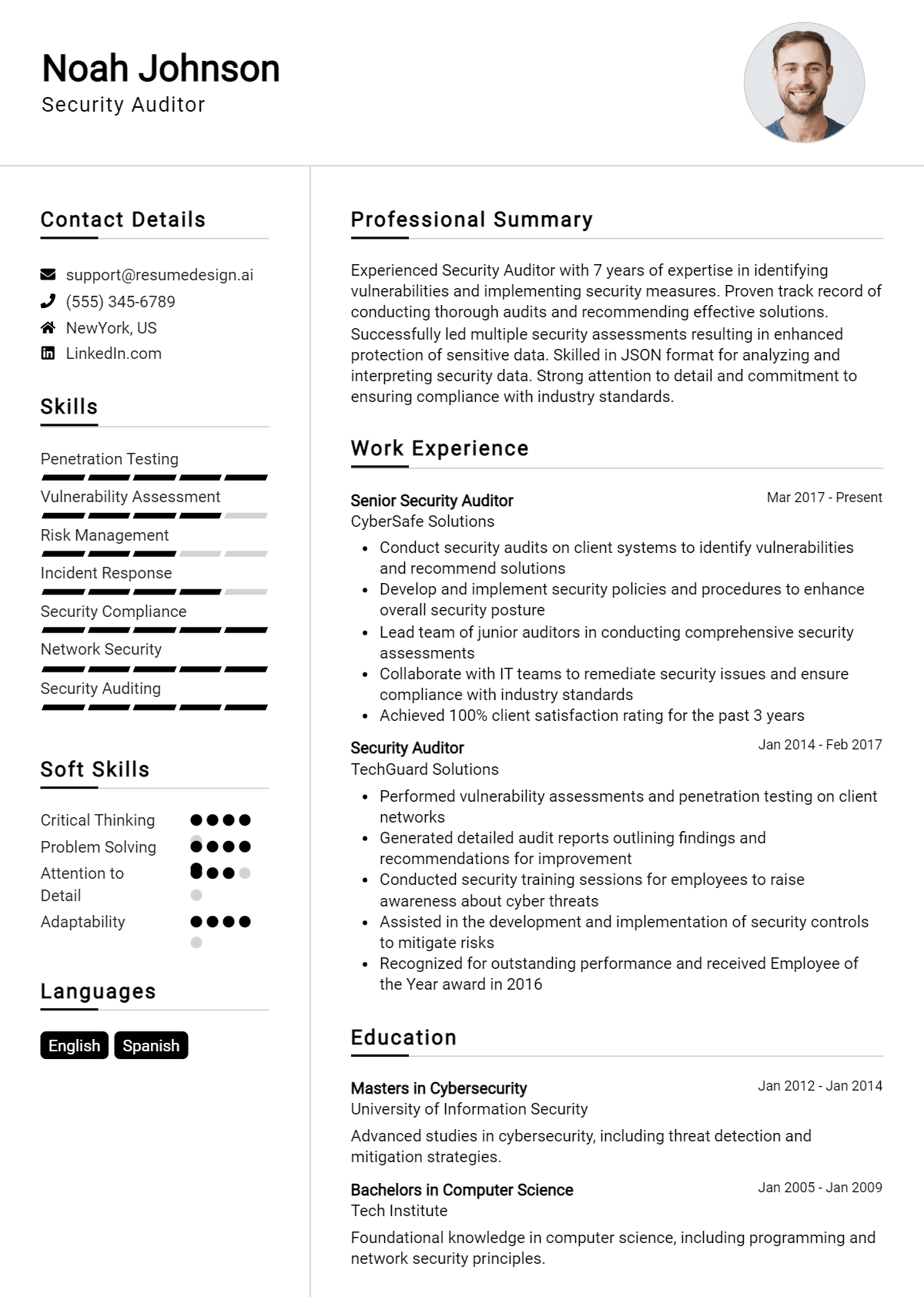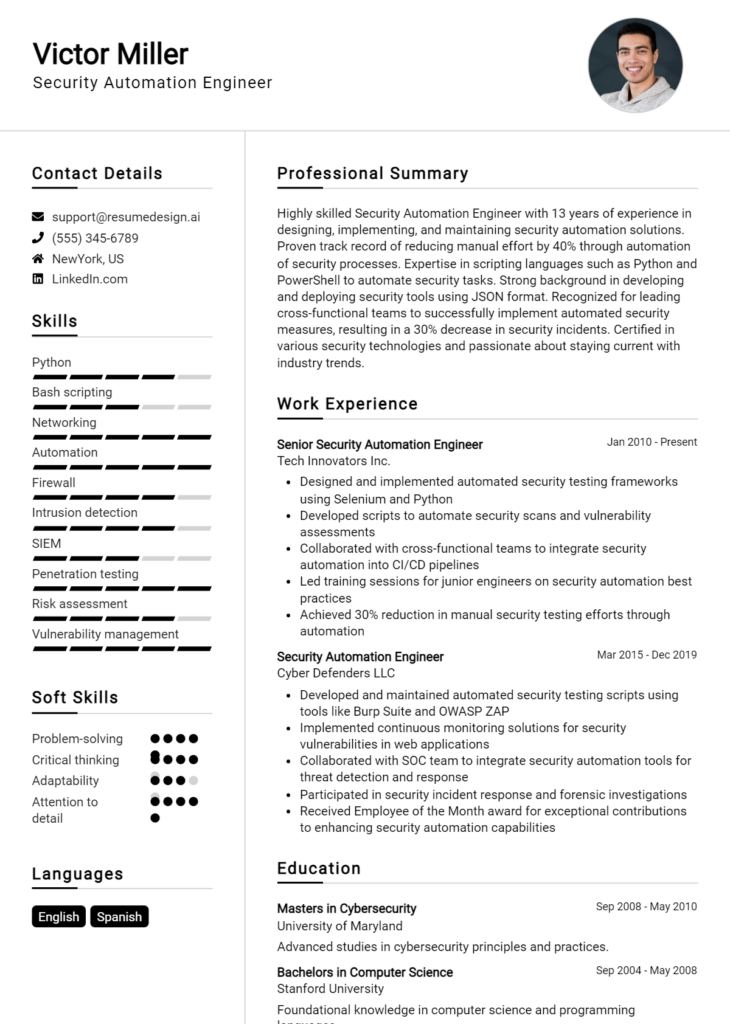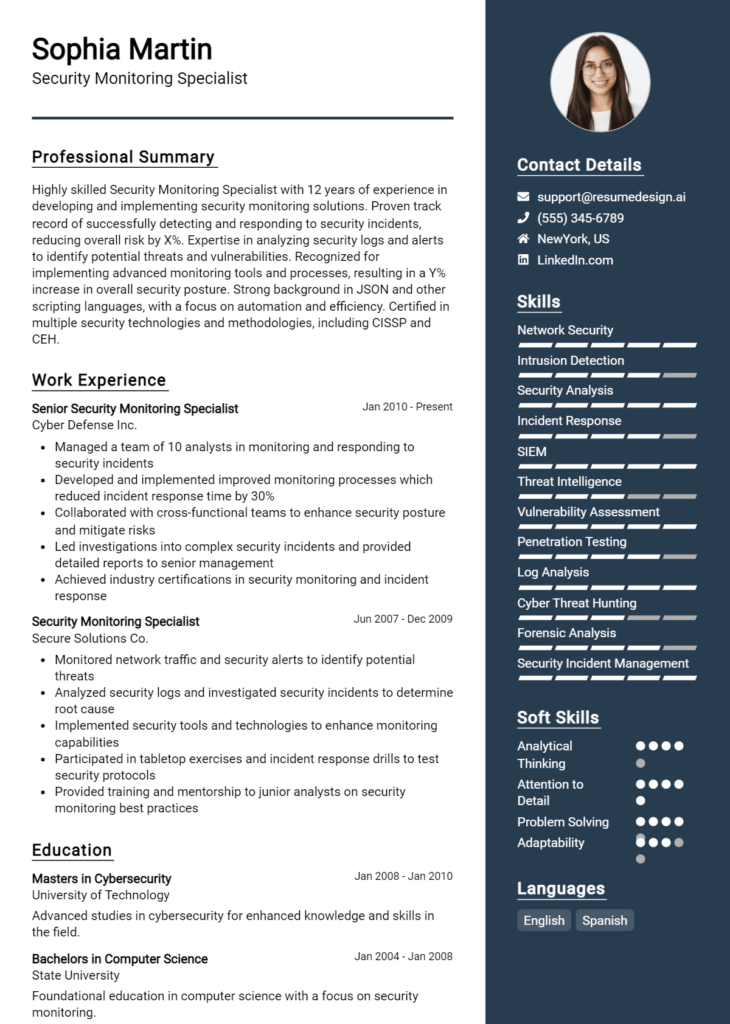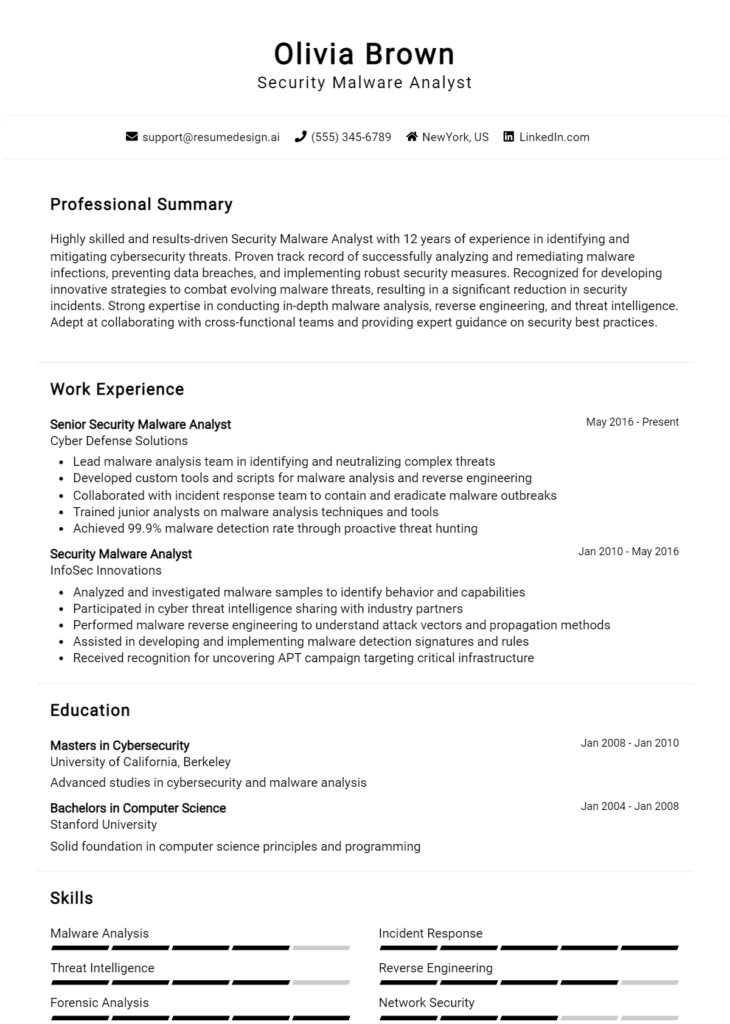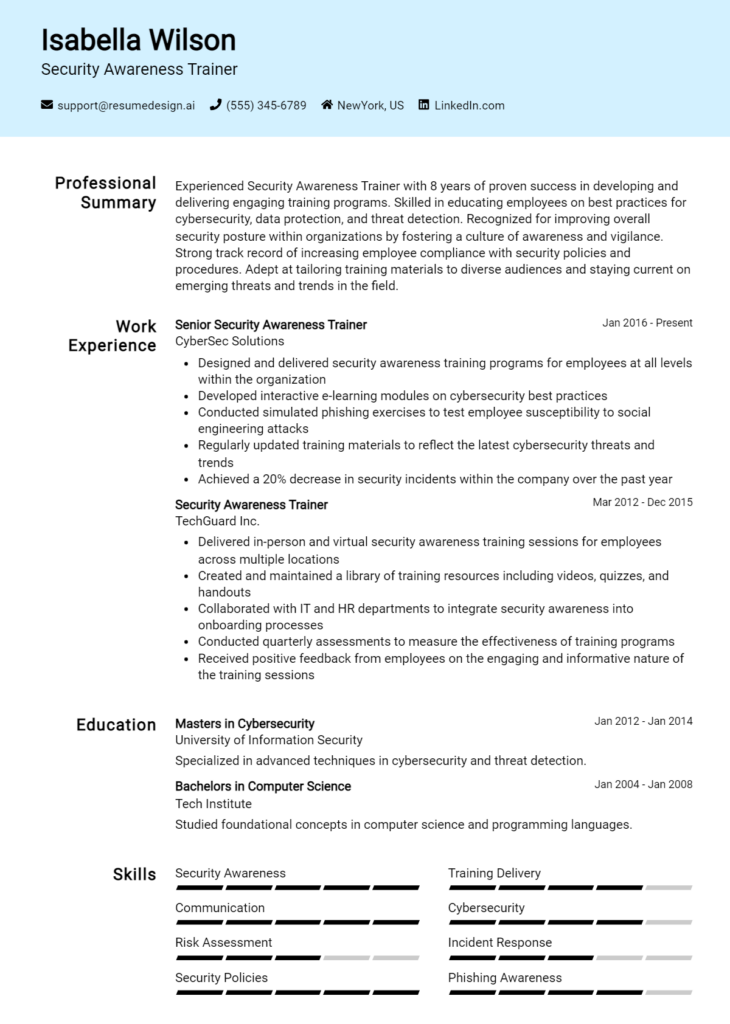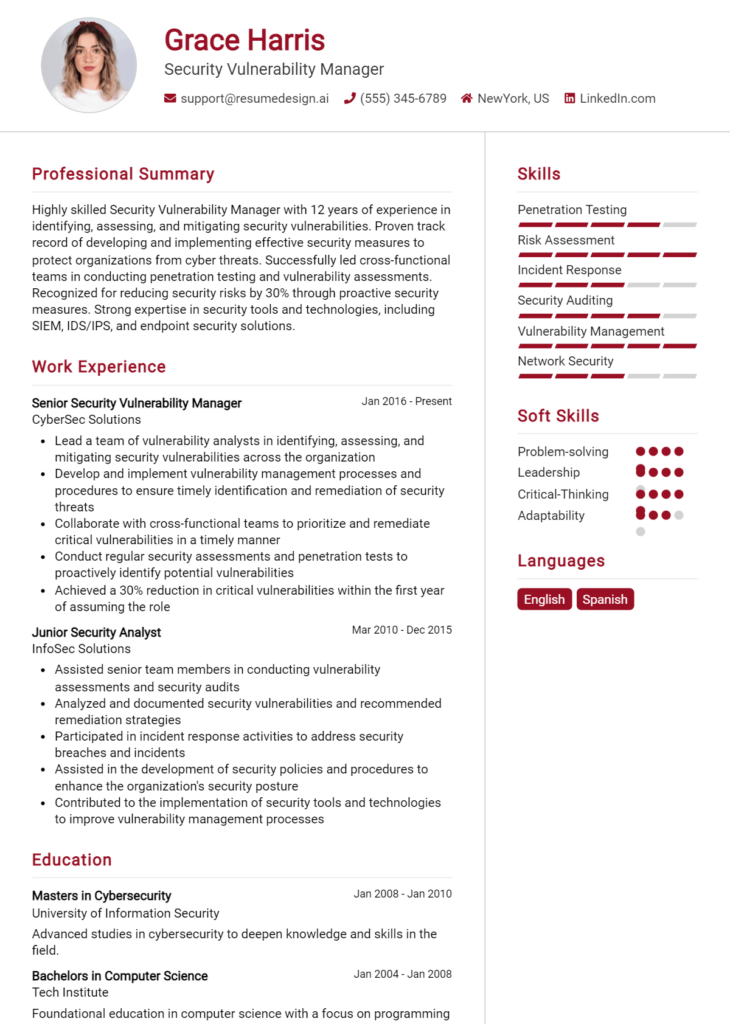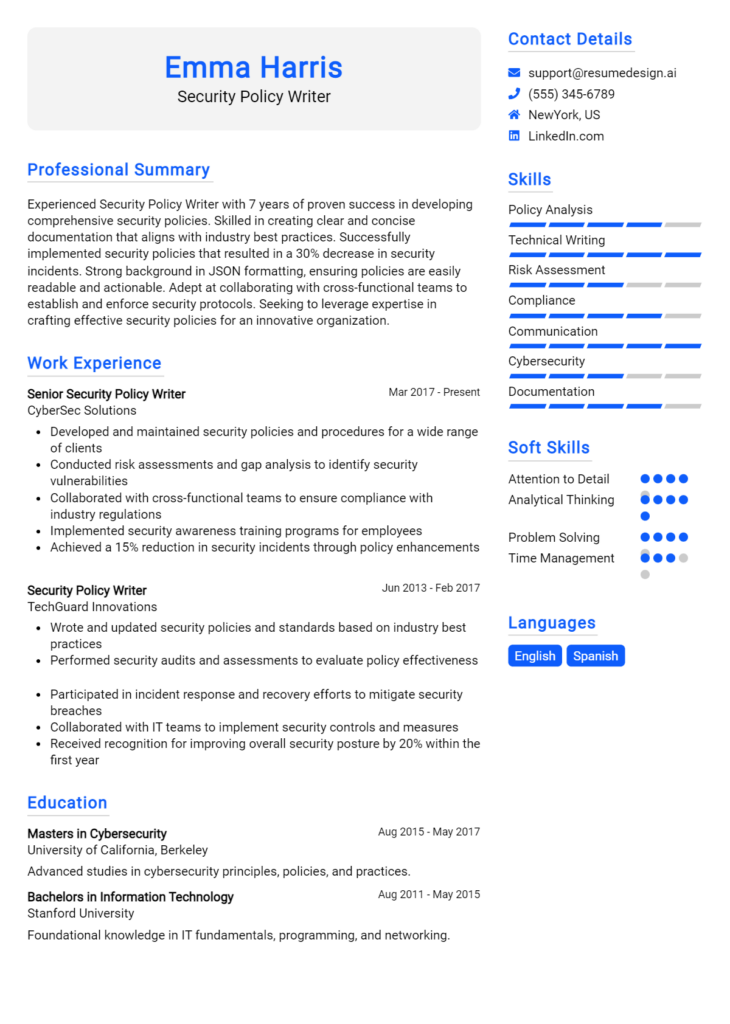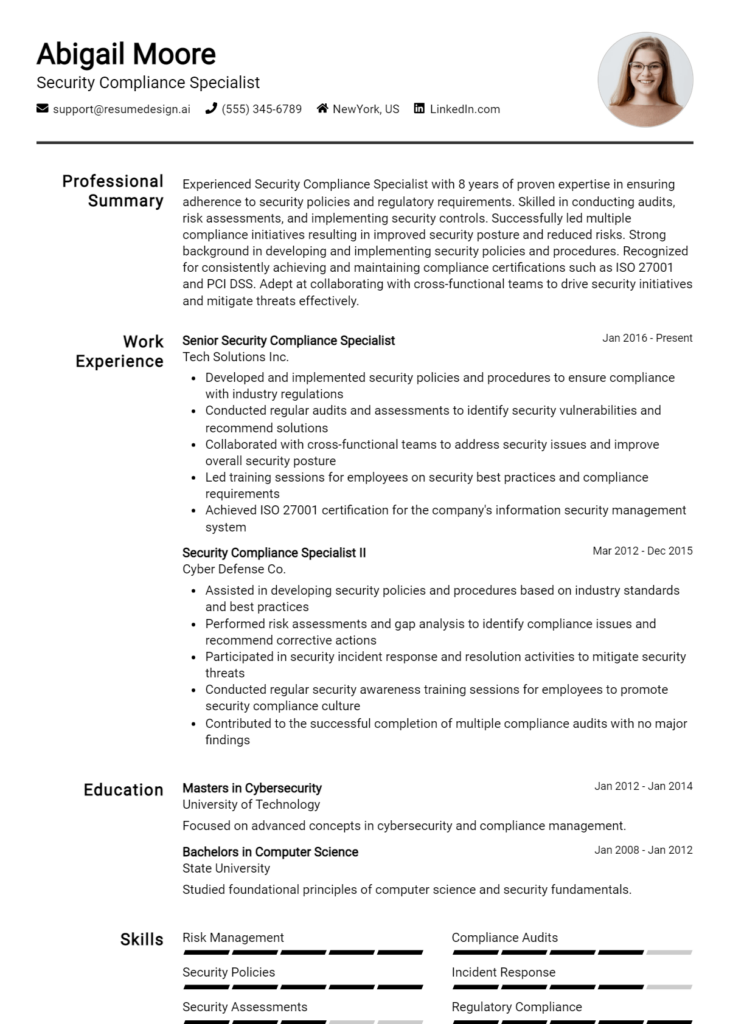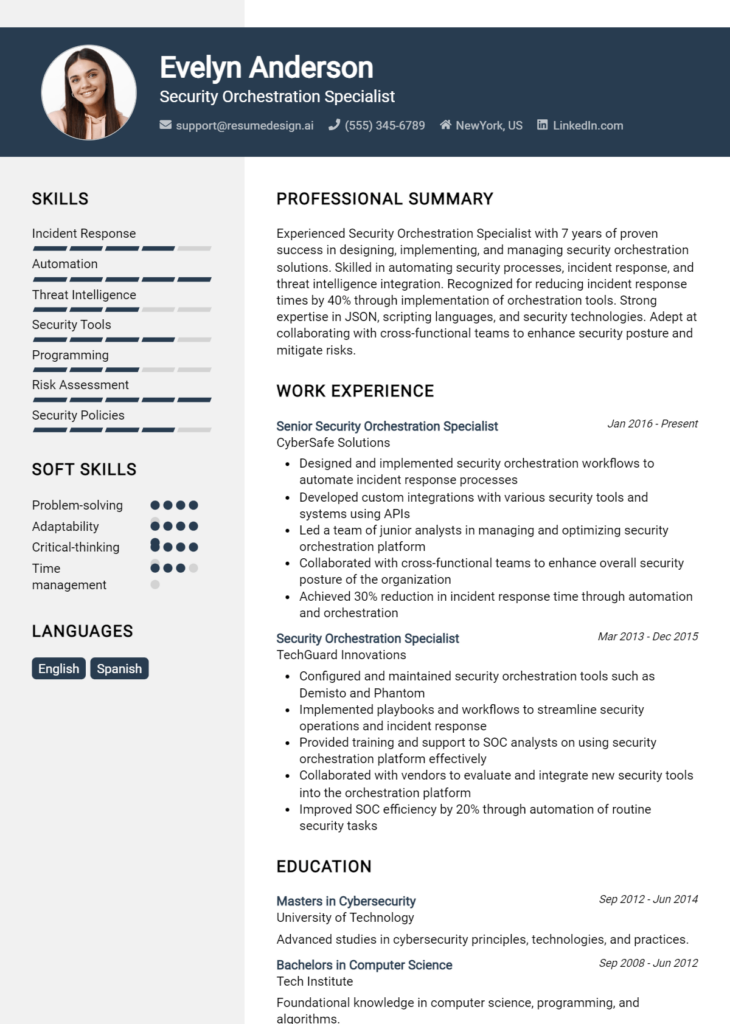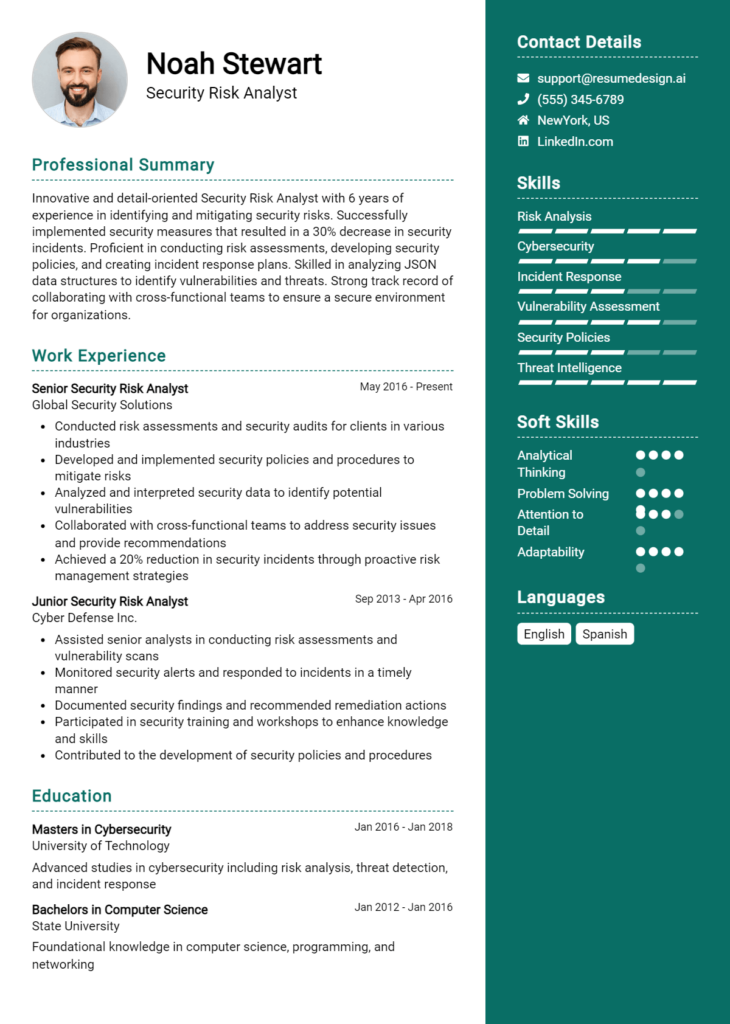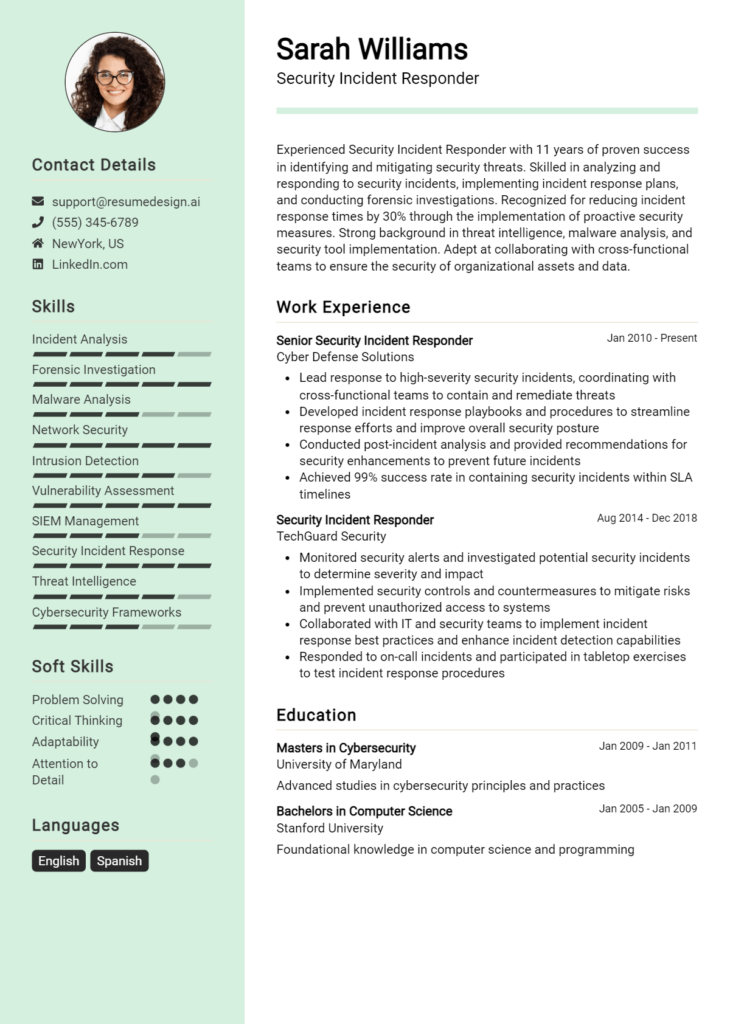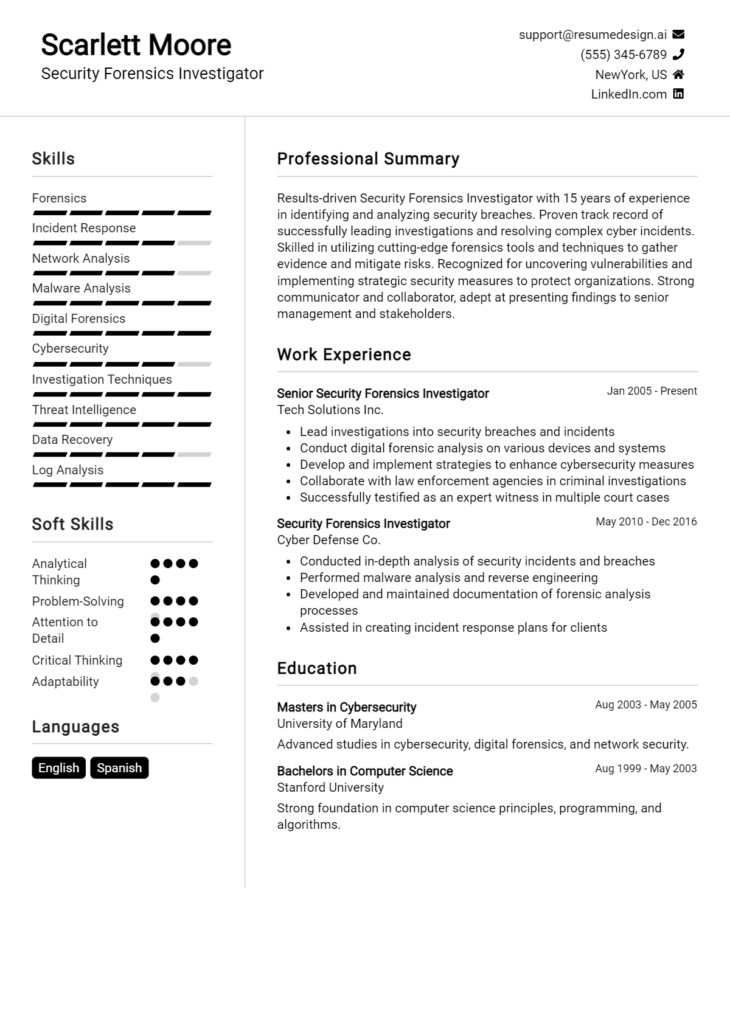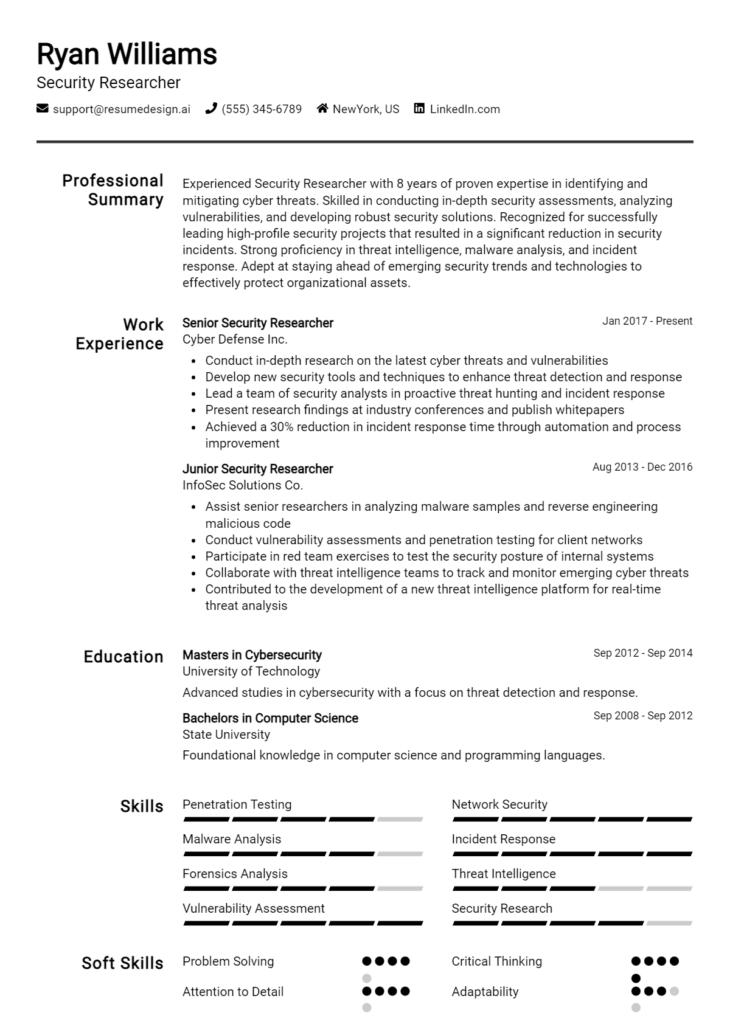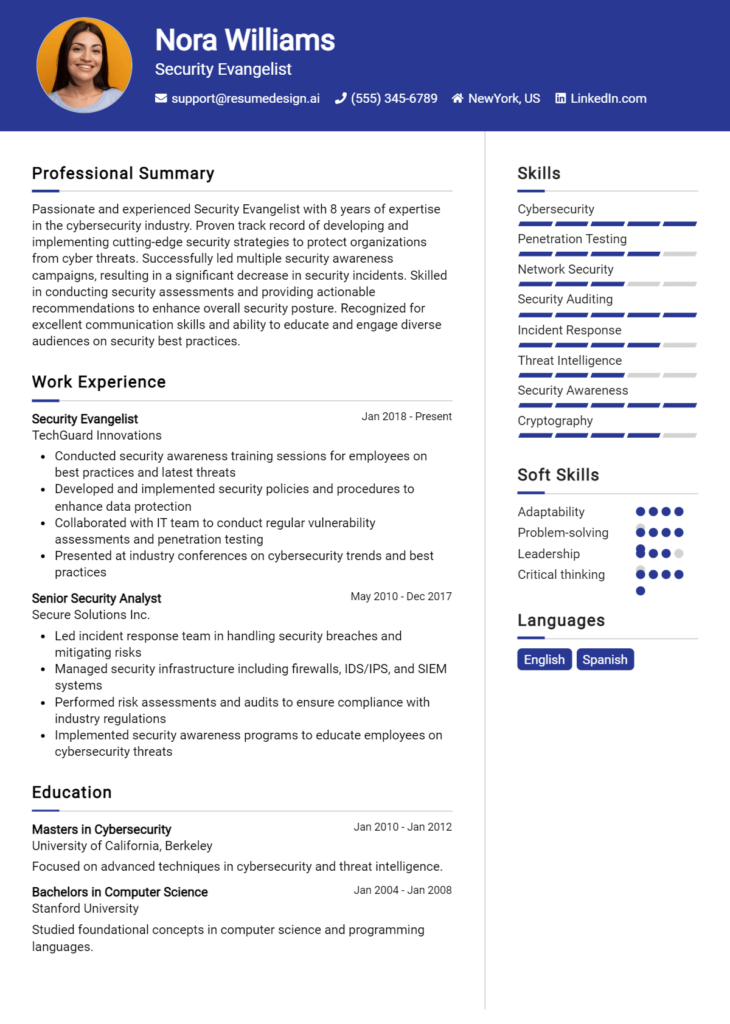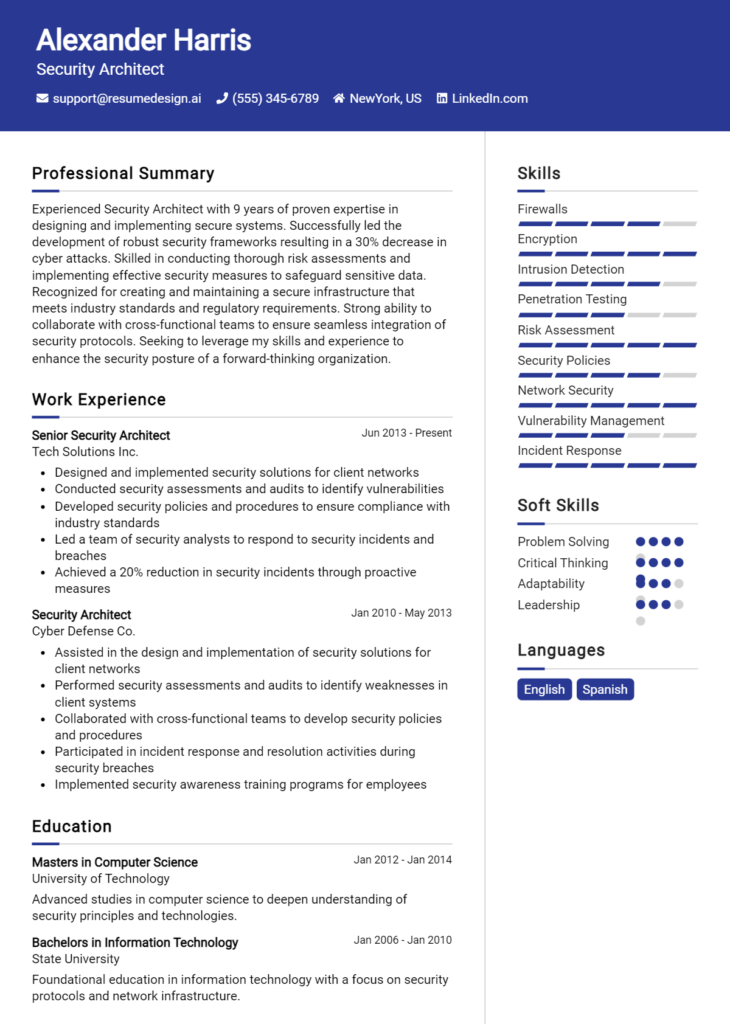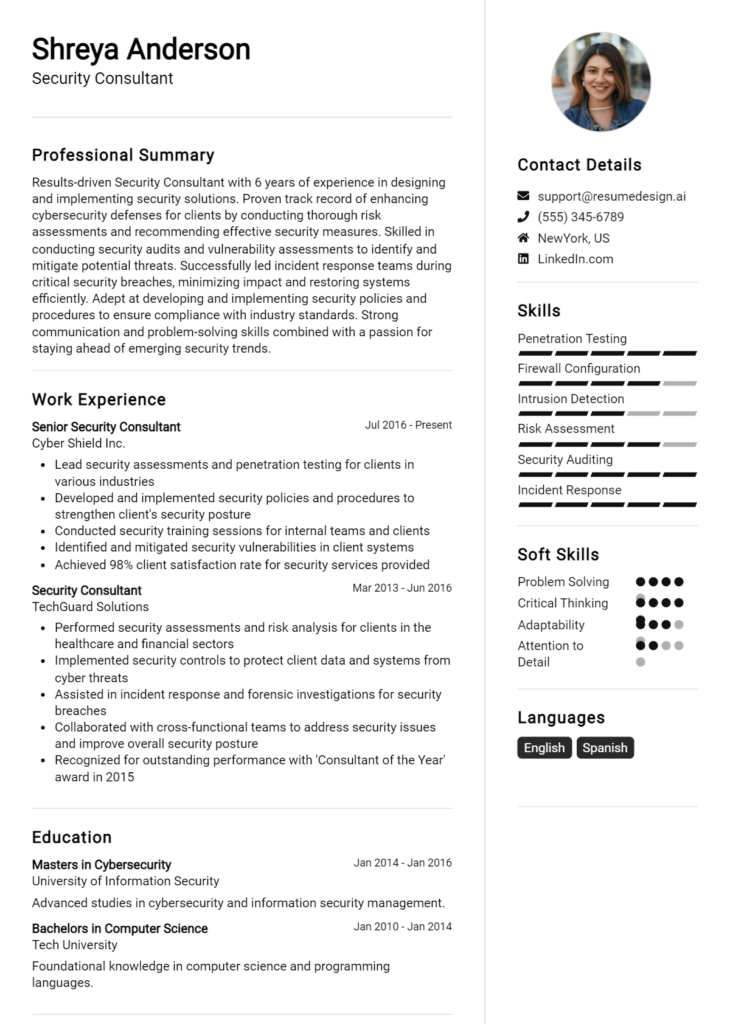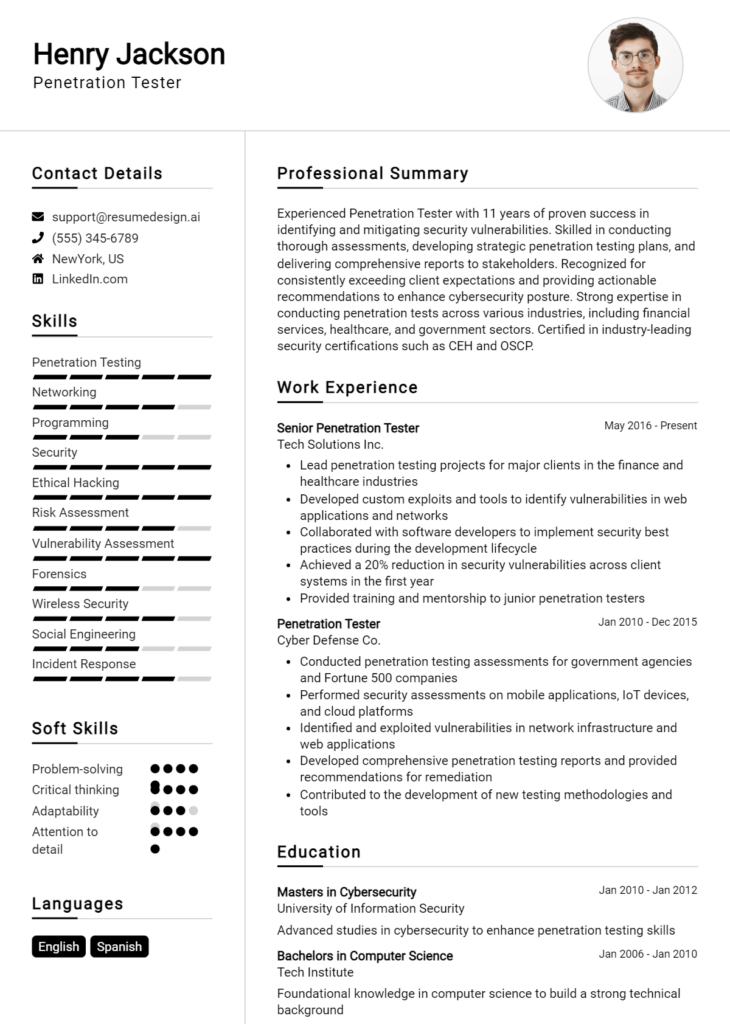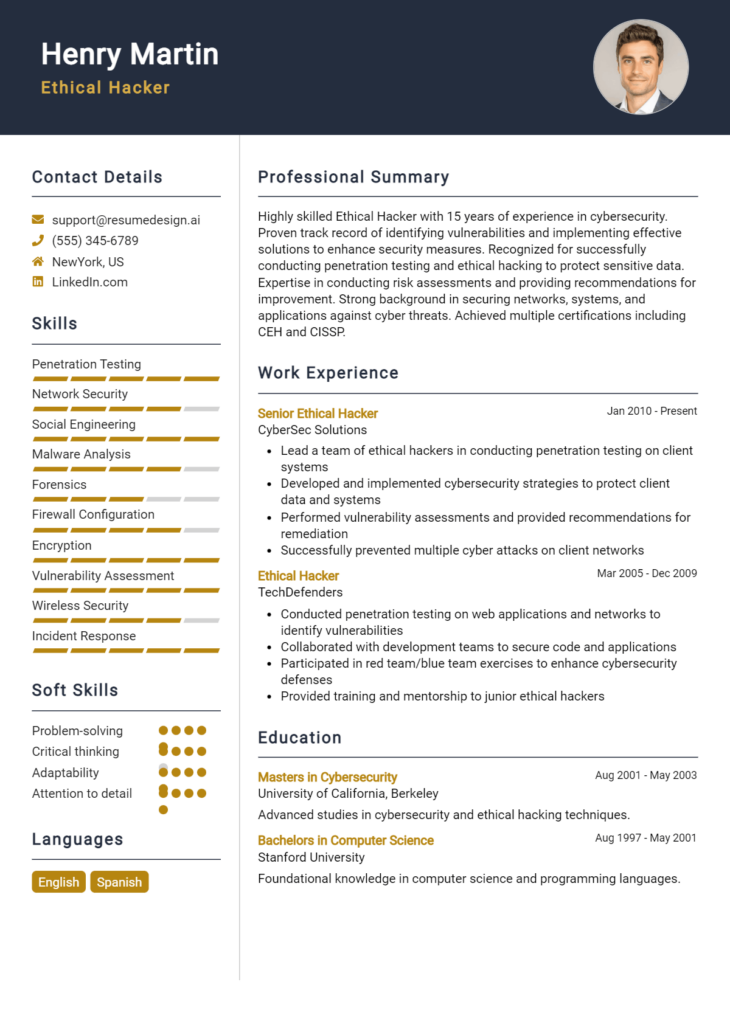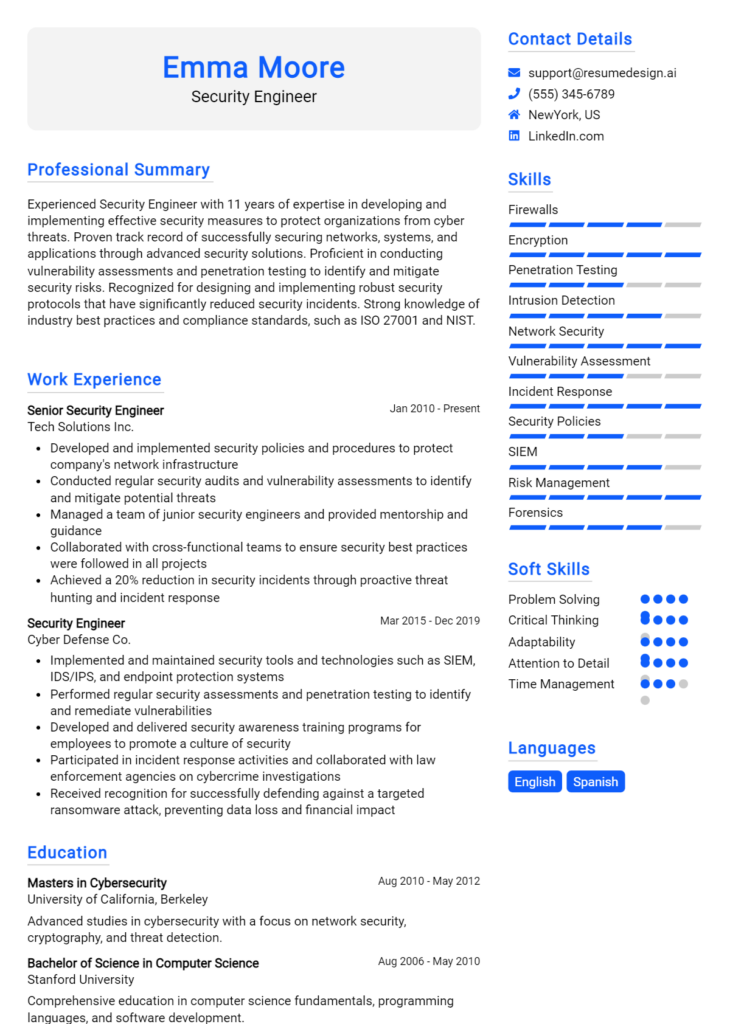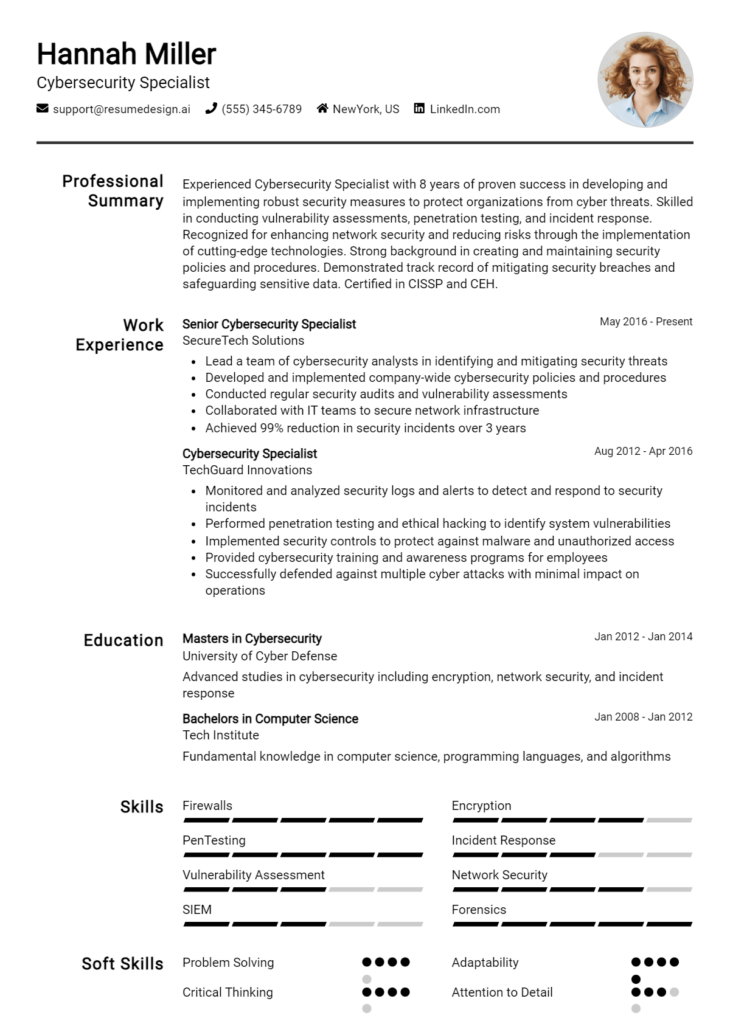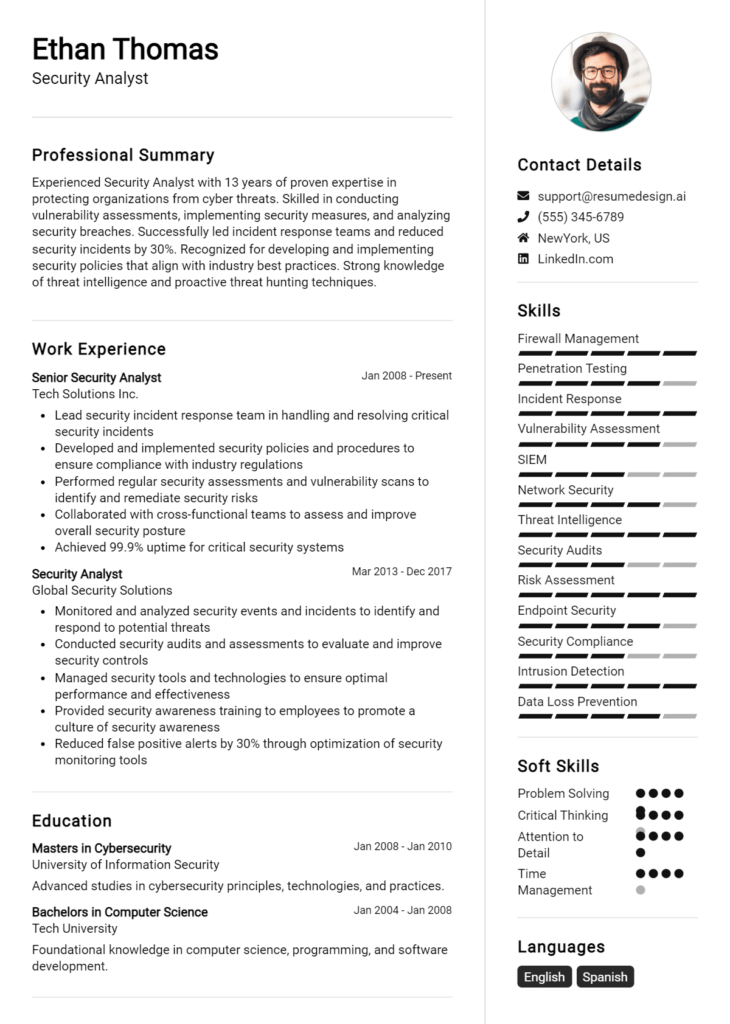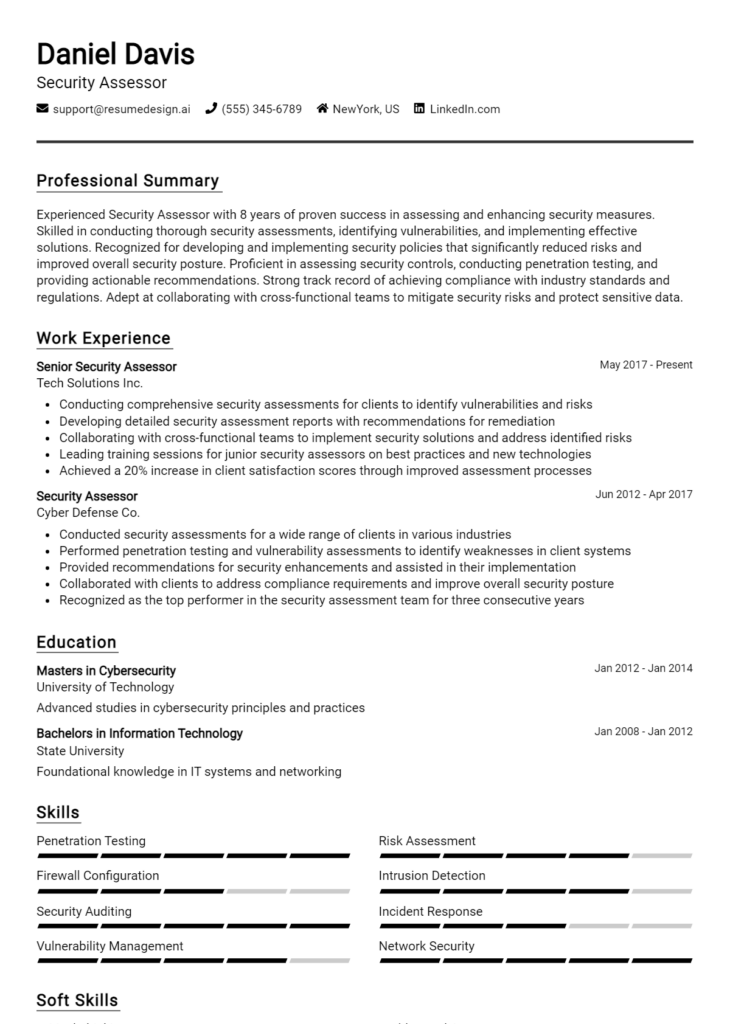Security Auditor Core Responsibilities
A Security Auditor plays a critical role in safeguarding an organization's information systems by assessing security measures, identifying vulnerabilities, and ensuring compliance with regulations. This position requires strong technical knowledge, operational insight, and exceptional problem-solving skills to bridge various departments, such as IT, compliance, and management. Effective communication and analytical abilities are essential for translating complex security concepts into actionable strategies. A well-structured resume highlighting these qualifications can significantly enhance career prospects.
Common Responsibilities Listed on Security Auditor Resume
- Conduct comprehensive security assessments and audits of information systems.
- Evaluate security policies and procedures for effectiveness and compliance.
- Identify vulnerabilities and recommend remediation strategies.
- Collaborate with IT teams to implement security controls and best practices.
- Prepare detailed audit reports and present findings to management.
- Stay updated on industry trends, threats, and regulatory changes.
- Conduct risk assessments and develop risk management strategies.
- Provide training and awareness programs for staff on security practices.
- Assist in incident response planning and execution.
- Monitor and analyze security incidents for continuous improvement.
- Review third-party vendor security practices and compliance.
High-Level Resume Tips for Security Auditor Professionals
In the competitive field of security auditing, a well-crafted resume is crucial for making a strong first impression on potential employers. Your resume serves as your personal marketing tool, showcasing your unique skills and achievements that set you apart from other candidates. It’s not just about listing responsibilities; it's an opportunity to highlight your expertise in identifying vulnerabilities, assessing risks, and implementing security measures. A compelling resume can open doors to interviews and ultimately help you secure the job you desire. This guide will provide practical and actionable resume tips specifically tailored for Security Auditor professionals, ensuring you present your qualifications in the best possible light.
Top Resume Tips for Security Auditor Professionals
- Tailor your resume to each job description by incorporating relevant keywords and phrases that align with the specific requirements of the position.
- Highlight your experience with security frameworks such as ISO 27001, NIST, or COBIT to demonstrate your knowledge of industry standards.
- Quantify your achievements by including metrics, such as the percentage of vulnerabilities mitigated or the number of audits completed successfully.
- Showcase your technical skills, including proficiency in security tools, software, and methodologies relevant to security auditing.
- Include certifications such as Certified Information Systems Auditor (CISA) or Certified Information Security Manager (CISM) to validate your expertise.
- Utilize a clear and concise format, ensuring that your resume is easy to read and visually appealing, with well-defined sections.
- Describe relevant projects or audits you’ve performed, focusing on your role and the impact of your contributions to the organization.
- Incorporate soft skills like analytical thinking, attention to detail, and communication abilities, as these are essential for a successful security auditor.
- Keep your resume to one or two pages, emphasizing quality over quantity, to maintain the attention of hiring managers.
By implementing these tips, you can significantly increase your chances of landing a job in the Security Auditor field. A polished and targeted resume not only highlights your qualifications but also demonstrates your commitment to the profession, making you a more attractive candidate to potential employers.
Why Resume Headlines & Titles are Important for Security Auditor
In the competitive field of cybersecurity, a Security Auditor's resume must stand out to capture the attention of hiring managers. Resume headlines and titles serve as the first impression of a candidate's qualifications, summarizing key skills and experiences in a single impactful phrase. A strong headline can immediately grab attention, conveying the candidate’s expertise and value proposition effectively. It should be concise, relevant, and directly aligned with the job being applied for, ensuring that hiring managers quickly understand the candidate's fit for the role.
Best Practices for Crafting Resume Headlines for Security Auditor
- Keep it concise and to the point, ideally under 10 words.
- Use industry-specific language that resonates with the job description.
- Highlight your most relevant skills and certifications.
- Incorporate quantifiable achievements when possible.
- Avoid generic phrases; be specific about your expertise.
- Use keywords from the job listing to enhance relevance.
- Position yourself as a problem-solver or value provider.
- Make sure it reflects your professional brand and career goals.
Example Resume Headlines for Security Auditor
Strong Resume Headlines
Certified Information Systems Auditor with 5+ Years of Experience in Risk Assessment
Experienced Security Auditor Specializing in Compliance and Vulnerability Management
Results-Driven Security Auditor with Proven Track Record in Mitigating Cyber Risks
Expert Security Auditor with a Focus on ISO 27001 Implementation and Auditing
Weak Resume Headlines
Security Auditor Looking for a Job
Experienced Professional in IT
Skilled Worker in Cyber Security
Strong headlines are effective because they immediately convey specific qualifications and expertise that align with the position, making it easier for hiring managers to see the candidate's potential value. In contrast, weak headlines fail to impress due to their vagueness and lack of specificity, leaving hiring managers unsure of what the candidate truly brings to the table. By focusing on clarity and relevance, candidates can create memorable first impressions that enhance their chances of landing an interview.
Writing an Exceptional Security Auditor Resume Summary
A resume summary is a critical component for a Security Auditor, serving as the first impression for hiring managers. A well-crafted summary succinctly highlights key skills, relevant experience, and notable accomplishments that align with the job role, enabling candidates to stand out in a competitive job market. By quickly capturing the attention of hiring managers, a strong summary can convey the candidate's value proposition, making it essential to tailor this section to the specific position being applied for. The result is a concise yet impactful introduction that sets the tone for the rest of the resume.
Best Practices for Writing a Security Auditor Resume Summary
- Quantify Achievements: Include specific numbers or percentages to illustrate your accomplishments.
- Focus on Relevant Skills: Highlight skills that are directly relevant to the Security Auditor position.
- Use Action Words: Employ powerful verbs to convey your contributions and impact.
- Tailor for the Job Description: Customize your summary to align with the keywords and requirements specified in the job listing.
- Be Concise: Aim for 2-4 sentences that deliver maximum information in minimal words.
- Highlight Certifications: Mention any relevant certifications or qualifications that enhance your expertise.
- Showcase Industry Knowledge: Demonstrate familiarity with industry standards and best practices in security auditing.
- Reflect Professional Growth: Indicate your career progression and commitment to ongoing learning in the field.
Example Security Auditor Resume Summaries
Strong Resume Summaries
Detail-oriented Security Auditor with over 5 years of experience conducting comprehensive security assessments and audits for Fortune 500 companies. Successfully identified and mitigated 90% of potential vulnerabilities, resulting in a 30% reduction in security incidents. Certified Information Systems Auditor (CISA) with a strong understanding of ISO 27001 and NIST frameworks.
Results-driven Security Auditor with a proven track record of enhancing organizational security measures. Led a team that improved compliance with regulatory standards by 40% through effective auditing practices. Expertise in risk assessment, penetration testing, and security policy development.
Experienced Security Auditor with a solid foundation in cybersecurity and risk management. Conducted over 50 security audits, uncovering critical vulnerabilities that saved the organization over $200,000 in potential threats. Proficient in using advanced auditing tools and methodologies.
Weak Resume Summaries
Ambitious professional looking for a Security Auditor position. I have some experience in security and understand the basics of auditing.
Security Auditor with various skills. I am eager to work in a team and help improve security protocols.
The strong resume summaries are effective because they provide quantifiable achievements, specific skills relevant to the role, and a clear demonstration of the candidate's impact on previous employers. In contrast, the weak summaries lack detail and specificity, making them vague and unmemorable. They fail to showcase the applicant's qualifications or how they can contribute to a potential employer, which diminishes their effectiveness in capturing the attention of hiring managers.
Work Experience Section for Security Auditor Resume
The work experience section of a Security Auditor resume is a critical component that effectively showcases a candidate's technical skills, leadership abilities, and commitment to delivering high-quality security solutions. This section not only highlights the individual's hands-on experience with various security tools and methodologies but also emphasizes their capacity to manage teams and collaborate with stakeholders to achieve organizational objectives. By quantifying achievements and aligning their experiences with industry standards, candidates can significantly enhance their appeal to potential employers, demonstrating their readiness to tackle complex security challenges.
Best Practices for Security Auditor Work Experience
- Clearly outline your technical skills relevant to security auditing, such as knowledge of security frameworks, tools, and compliance standards.
- Quantify your achievements with specific metrics, such as percentage reductions in vulnerabilities or improvements in compliance scores.
- Highlight your leadership and team management experience, showcasing your ability to guide cross-functional teams towards successful project outcomes.
- Use action verbs to describe your contributions, making your statements more engaging and impactful.
- Align your experiences with industry standards and frameworks, such as ISO 27001, NIST, or CIS controls.
- Include relevant certifications and training to reinforce your expertise and commitment to continuous learning.
- Focus on results-driven narratives that illustrate your problem-solving capabilities in real-world scenarios.
- Tailor your work experience descriptions to match the specific requirements of the job you are applying for.
Example Work Experiences for Security Auditor
Strong Experiences
- Led a comprehensive security audit for a financial institution, resulting in a 40% reduction in security incidents over 12 months.
- Implemented an automated vulnerability assessment tool, increasing the efficiency of threat detection by 60% and reducing manual labor hours.
- Managed a cross-functional team of 5 auditors to develop a risk management framework that improved compliance with regulatory requirements by 30%.
- Conducted over 50 security assessments, providing actionable recommendations that enhanced the overall security posture of the organization.
Weak Experiences
- Worked on security projects as part of a team.
- Assisted in conducting audits and other security-related tasks.
- Participated in meetings about security practices.
- Helped improve security measures in various capacities.
The examples listed as strong experiences illustrate specific, quantifiable outcomes and demonstrate clear leadership and collaborative efforts within the security auditing framework. They effectively communicate the candidate's contributions and impact on the organization. In contrast, the weak experiences are vague and lack detail, providing little insight into the candidate's actual skills or achievements. To stand out, it is crucial for candidates to focus on delivering concrete examples that highlight their strengths and capabilities in the field of security auditing.
Education and Certifications Section for Security Auditor Resume
The education and certifications section of a Security Auditor resume is crucial for showcasing a candidate's academic qualifications, industry-specific certifications, and commitment to continuous learning. This section not only highlights the foundational knowledge gained through formal education but also reflects the candidate's dedication to professional development through relevant certifications and specialized training programs. By providing detailed information about coursework, certifications, and ongoing education, candidates can significantly enhance their credibility and demonstrate their alignment with the job role, making them more appealing to potential employers.
Best Practices for Security Auditor Education and Certifications
- Include relevant degrees such as a Bachelor's or Master's in Cybersecurity, Information Technology, or related fields.
- List industry-recognized certifications such as Certified Information Systems Auditor (CISA), Certified Information Systems Security Professional (CISSP), or Certified Ethical Hacker (CEH).
- Provide details on specialized training programs that relate to security auditing, risk management, or compliance.
- Highlight any coursework that directly pertains to security auditing, such as network security, risk assessment, and security compliance.
- Utilize a clear format that distinguishes between degrees, certifications, and training for easy readability.
- Emphasize any continuing education efforts, such as workshops or conferences attended in the field of cybersecurity.
- Be specific about the dates of completion for certifications to show currency and relevance.
- Tailor the education and certifications section to align with the job description, focusing on the most relevant qualifications.
Example Education and Certifications for Security Auditor
Strong Examples
- Bachelor of Science in Cybersecurity, University of XYZ, 2020
- Certified Information Systems Auditor (CISA), ISACA, 2021
- Master's in Information Security Management, ABC University, expected graduation 2023
- Coursework in IT Risk Management, Network Security, and Compliance Auditing
Weak Examples
- Associate Degree in General Studies, Community College, 2018
- Certification in Microsoft Office Suite, 2019
- High School Diploma, 2017
- Outdated certification in Windows Server Administration, 2016
The examples provided illustrate the importance of relevance and specificity in the education and certifications section. Strong examples showcase degrees and certifications that are directly related to cybersecurity and security auditing, demonstrating the candidate's preparedness for the role. In contrast, weak examples include qualifications that do not align with the demands of a Security Auditor position, such as unrelated degrees or outdated certifications, which can detract from the candidate's perceived qualifications and readiness for the job.
Top Skills & Keywords for Security Auditor Resume
In the competitive field of cybersecurity, a well-crafted resume is essential for a Security Auditor to stand out. Highlighting the right skills can make a significant difference in showcasing your qualifications and experiences. Security Auditors are responsible for assessing and improving an organization's security posture, making it crucial to emphasize both hard and soft skills. These skills not only reflect your technical capabilities but also your ability to communicate effectively and work collaboratively with various stakeholders. By focusing on the most relevant skills in your resume, you increase your chances of capturing the attention of hiring managers and landing interviews.
Top Hard & Soft Skills for Security Auditor
Soft Skills
- Attention to Detail
- Critical Thinking
- Problem-Solving
- Communication Skills
- Team Collaboration
- Time Management
- Adaptability
- Analytical Skills
- Decision-Making
- Ethical Judgement
- Conflict Resolution
- Negotiation Skills
- Leadership
Hard Skills
- Risk Assessment
- Vulnerability Scanning
- Security Auditing Techniques
- Compliance Standards (e.g., ISO 27001, NIST)
- Firewall and Intrusion Detection Systems
- Penetration Testing
- Security Information and Event Management (SIEM)
- Networking Protocols
- Data Encryption Techniques
- Incident Response
- Operating Systems Security
- Malware Analysis
- Cloud Security
- Regulatory Knowledge (GDPR, HIPAA)
- Forensics and Incident Investigation
To ensure your resume reflects the best of your capabilities, consider exploring additional resources on skills and work experience. These tools can help you better articulate your qualifications in the ever-evolving field of security auditing.
Stand Out with a Winning Security Auditor Cover Letter
I am writing to express my interest in the Security Auditor position at [Company Name], as advertised on [where you found the job posting]. With a solid background in information security, risk assessment, and compliance, I am confident in my ability to contribute effectively to your team and help fortify your organization's security posture. My hands-on experience in evaluating security controls and conducting audits aligns well with the requirements of this role.
In my previous position at [Previous Company Name], I successfully led a team that conducted comprehensive security audits and assessments, identifying vulnerabilities and recommending effective remediation strategies. I have a proven track record of analyzing security policies, processes, and technologies to ensure compliance with industry standards such as ISO 27001, NIST, and GDPR. My attention to detail and analytical mindset have enabled me to uncover potential risks and implement safeguards that enhance overall security.
I am particularly drawn to [Company Name] because of your commitment to innovation and your proactive approach to cybersecurity. I am eager to bring my expertise in security frameworks and risk management to your organization, collaborating with cross-functional teams to create a robust security environment. My passion for continuous improvement and staying abreast of the latest security trends will ensure that [Company Name] remains a leader in safeguarding sensitive information.
Thank you for considering my application. I look forward to the opportunity to discuss how my skills and experiences align with the goals of your security team. I am excited about the prospect of contributing to [Company Name] and helping to protect its critical assets from emerging threats.
Common Mistakes to Avoid in a Security Auditor Resume
When crafting a resume for a Security Auditor position, it's crucial to present your skills and experiences in a way that highlights your qualifications while avoiding common pitfalls. A well-structured resume not only captures the attention of hiring managers but also effectively communicates your expertise in security auditing. However, many candidates fall into certain traps that can undermine their chances of landing an interview. Here are some common mistakes to avoid:
Generic Objective Statements: Using a vague or generic objective fails to demonstrate your specific interest in the Security Auditor role and doesn't showcase how your goals align with the company's mission.
Lack of Quantifiable Achievements: Failing to include measurable outcomes from previous roles can make it hard for employers to gauge your impact. Instead of saying "improved security protocols," specify "reduced security breaches by 30% through enhanced auditing procedures."
Overloading with Technical Jargon: While it's important to showcase technical skills, excessive jargon can alienate readers who may not be familiar with specific terms. Aim for clarity and balance between technical language and comprehensibility.
Ignoring Soft Skills: Security Auditors also need strong communication and teamwork skills. Neglecting to mention these attributes may make it seem like you only focus on technical abilities.
Inconsistent Formatting: A messy or inconsistent format can detract from the professionalism of your resume. Ensure uniformity in font size, headings, and bullet points to create a polished look.
Not Tailoring the Resume for Each Application: Sending out the same resume to multiple employers can lead to missed opportunities. Tailor your resume to highlight the skills and experiences that are most relevant to each specific position.
Neglecting Continuing Education: The field of security is constantly evolving. Failing to mention relevant certifications, courses, or training can give the impression that you are not keeping up with industry standards.
Omitting Contact Information: It may seem basic, but forgetting to include your contact information or making it difficult to find can hinder potential employers from reaching out to you. Always ensure this information is clearly displayed at the top of your resume.
Conclusion
In conclusion, the role of a Security Auditor is critical in safeguarding an organization's information systems against potential threats and vulnerabilities. Throughout this article, we covered the essential skills and qualifications required for a Security Auditor, including knowledge of security frameworks, risk assessment techniques, and compliance standards. We also highlighted the importance of continuous education and certification in this ever-evolving field to stay ahead of emerging security challenges.
As you reflect on your qualifications and experiences, now is the perfect time to ensure your Security Auditor resume stands out. A polished and professional resume can make a significant difference in your job search. We encourage you to explore the various resources available to enhance your resume.
Check out these helpful tools:
- Resume Templates to find a format that suits your style.
- Resume Builder for an easy and efficient way to create a customized resume.
- Resume Examples for inspiration on how to present your skills effectively.
- Cover Letter Templates to accompany your resume and make a strong first impression.
Take the next step in your career by reviewing and updating your Security Auditor resume today!

